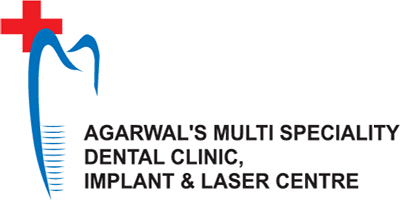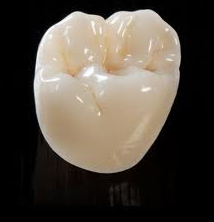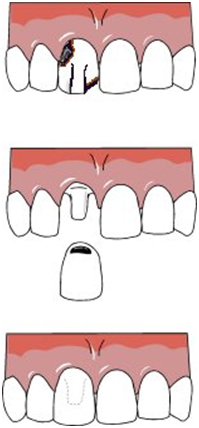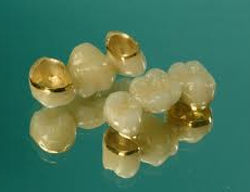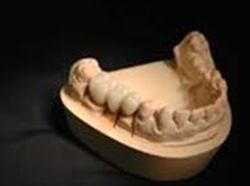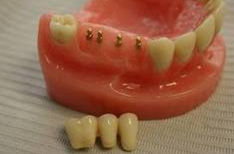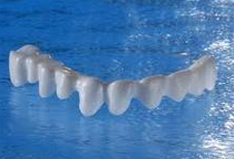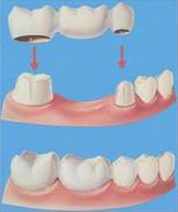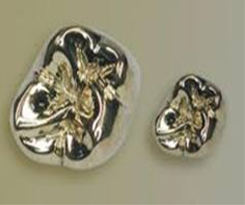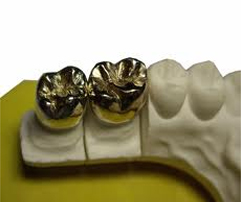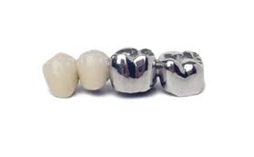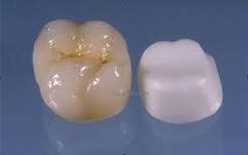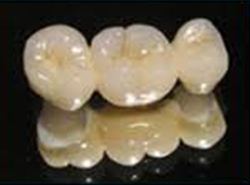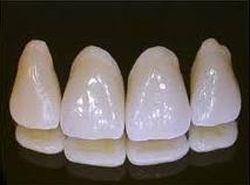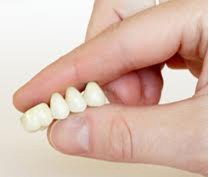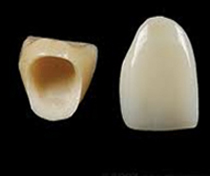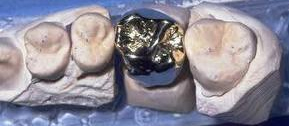Crowns & Bridges
A crown is specially designed cap that fits over a broken / Root Canal treated tooth to regain its normal shape & size. A Bridge, as the name suggests, bridges the gap created by missing teeth to replace it.
Crowns
What is a Crown?
A crown, usually called as a cap, is an unnatural hollow cover resembling a natural tooth crown that restores a decayed or damaged tooth to its normal size and shape. It is made out of metal or ceramic material by a distinctive procedure in a dental lab.
Where can Crown be placed?
- Crown is placed over all the teeth that have had root canal treatments done and should be covered with crowns to prevent their breakage as they have lost their natural hydrating mechanism and tend to be brittle.
- Teeth that have been restored more than half by filling material should be crowned.
- Crown helps to improve the aesthetics of tooth with bad aesthetics.
- Harm to the tooth structure because of wear and tear can be altered with a crown.
- A fractured tooth can be restored with a crown.
- Teeth with ample spaces between them resulting in food lodgment or unpleasant appearance can be crowned.
Bridges
A fixed bridge can replace one or more missing teeth. It consists of one or more artificial solid teeth suspended to crowns that are placed on two or more supporting teeth. Fixed bridge helps to reestablish normal function and precise position of your bite. It is made of various metals, porcelain, or a combination of the two.
Where is it Indicated?
- If one or more teeth are missing it can be restored with fixed bridge.
- If the jaw has generalized space in between the teeth, the fixed bridge can fill the gaps.
- Can be placed over implants to support implant partially or with full mouth bridge.
What are the advantages of a Bridge?
- This is a fixed partial denture and it is unremovable once it is fixed.
- If maintained properly, it can stay for a longer period.
- Comparatively less expensive to dental implants.
- No surgery is required.
What are the disadvantages of a Bridge?
- The supporting teeth needs to be trimmed.
- They are more expensive than removable dentures.
- Difficult to maintain oral hygiene.
- Does not prevent bone loss.
What are the limitation of a Bridge?
- Bridge should be avoided if the teeth which are going to support the bridge are not firm.
- If number of missing teeth is higher in number than of present teeth than a fixed bridge can’t be given.
How are Crown/Bridges made?
1) The tooth is trimmed to perfect shape to accommodate the Crown/Bridge.
2) An impression is made with an impression material to replicate the tooth outside the mouth.
3) Then a model is made from this impression with a special dental stone which will represent patient’s teeth.
4) The model is sent to a dental lab where a crown/bridge is fabricated.
5) When a Crown/Bridge is ready, it is bonded with a special type of dental cement to the trimmed tooth in the patient’s mouth by the dentist.
Various types of Crowns/Bridges
- All metal
- Porcelain fused to metal (tooth coloured)
- All porcelain (metal free)
- Zirconium based (metal free)
- Precious metal
All metal Crown/Bridges
Advantages
- They are the most stable crowns available.
- They are nearly indestructible and hence there is no porcelain to chip or break.
- They can be even made in quite thin areas in which there is little room.
- They need less tooth reduction.
Disadvantage
- The significant disadvantage of this crown is its aesthetics. They are very unaesthetic and can’t be used in front teeth region.
Porcelain Fused to Metal
Advantages
- PFM's are the most effective esthetic crowns in the dentistry and have the benefit of the added stability provided by the bevel at the finish line.
- They can be given in the front teeth region also.
Disadvantage
- The major disadvantage of this crown is that it requires more space to accommodate porcelain.
- Because of Metal inside, the gum line tattooing can be observed at a later stage.
- Because of metal inside, it has to be masked by an opaquer making the overall look of the crown/bridge more opaque ( slightly artificial).
All Porcelain Crown/Bridges
Advantages
- All-porcelain crowns are aesthetically the best choice for anterior teeth.
- They spread light like a real tooth. So gives the best hue for front teeth and therefore does not look artificial.
Disadvantage
- The major disadvantage of this crown is they are not strong enough to bear occlusal forces.
- Can’t be done in posterior teeth.
Zirconium Based Crown/Bridges
Advantages
- Crowns with zirconium copings are almost as strong as porcelain combined to metal crowns.
- They are suitable for posterior, as well as anterior teeth, and they have nearly the same premium esthetics as all-porcelain crowns.
Precious Metal Crown/Bridges
They are made from precious metals like gold and palladium.
